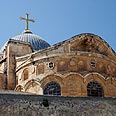
Jerusalem Christians say Easter traditions at risk
Christians say Israeli security measures obstruct access to capital's holy sites. 'In the last two or three years, it was like a military zone,' human rights lawyer says. 'Their justification is security, this holy word. It is wrong. I want to go and pray,' resident says
As a boy growing up in Jerusalem, Yacoub Dahdal saw Christians from all over the Middle East converge on the city at Easter time to walk in the footsteps of Jesus.
Thousands would be hosted in the homes of the city's residents. Many would depart the city as godparents to newly born Jerusalemites baptized during the pilgrimage season.
"It was a festival with every meaning of the word," said Dahdal, now aged 72 and a senior member of the Palestinian Christian community in Jerusalem. "The Egyptians would come by train, the Lebanese and Syrians by bus," he said.
"Imagine when you were down in the Old City, you would hear all the different accents: Lebanese, Jordanian, Egyptian, Syrian, mixed together," he said. "It was a real joy."
Today, he reflects on a very different Easter atmosphere in a city where tension is often more apparent than spirituality.
The home where he was born in the Old City's Muslim quarter, just a short walk from the First Station of the Cross, is today adorned with Israeli flags and houses settlers who have moved in since Israel captured east Jerusalem in the 1967 war.
Since that conflict, the flow of pilgrims from neighboring Arab states has dried up. Syria and Lebanon remain in a state of war with Israel. Few Egyptians or Jordanians make the trip, though their governments have made peace with the Jewish state.
Christian pilgrims still fly in for Easter, from Germany, Peru or Russia, as tourists on a once-in-a-lifetime visit who are largely unaware of Israeli restrictions -- apart from the obvious fact that police seem to be around every corner.
But the number of Palestinian pilgrims has fallen to a fraction of its former level. Local Christians warn that centuries-old traditions are at risk of dying out.
'I'm not ready, at my age, to confront Israeli soldiers'
Israeli security measures, they say, have obstructed their access to Jerusalem and its holy sites, chief among them the Church of the Holy Sepulchre, revered as the site of the crucifixion and resurrection of Jesus.
An Israeli police spokesman said thousands of pilgrims came to the city unhindered every year. "This year there is expected even a greater number. At the same time, Israeli police are carrying out standard security procedures, which are implemented at this time of year."
Palestinians who live in the West Bank, including Bethlehem, and the Gaza Strip - also occupied by Israel in 1967 - need a permit to get into Jerusalem.
Israel says it has issued 10,000 permits to West Bank residents this year as an Easter goodwill gesture. Five hundred were issued to Christians in Gaza, who number several thousand.
Israel tightened movement restrictions during the armed uprising waged by Palestinians earlier this decade, building the West Bank barrier which skirts around Jerusalem's eastern rim and cuts the city off from towns such as Bethlehem.
Palestinians argue that such controls on their access to Jerusalem run contrary to Israel's claim that it respects freedom of worship in the city.
In recent years, Palestinian Christians who have made it to Jerusalem have protested over curbs on access to the holy sites themselves. "In the last two or three years, it was like a military zone," said Mazen Qupty, a human rights lawyer who represents a number of churches.
As a result, there has been a big drop in local participation in Easter week ceremonies, say Christian figures. Last year, for example, no more than a few hundred Palestinians made it to the Church of the Holy Sepulchre for the ceremony of Holy Fire, when believers gather to witness the emergence of candles lit by a miracle in the tomb of Jesus.
Though it falls on the Saturday before Orthodox Easter, local Christians of all denominations have attended the ceremony for generations in what has always been a major community event.
"There used to be thousands, or tens of thousands," said Qupty. "Today, last year, if I said hundreds, I'd be exaggerating," he said.
Yacoub Dahdal has decided against even trying to reach the Church of the Holy Sepulchre this Easter. Last year, he obtained an Israeli-issued permit to get to the church but says he was blocked by Israeli security forces. "I am not ready, at my age, to confront Israeli soldiers," he said.
"Their justification is security, this holy word. It is wrong. I want to go and pray."










